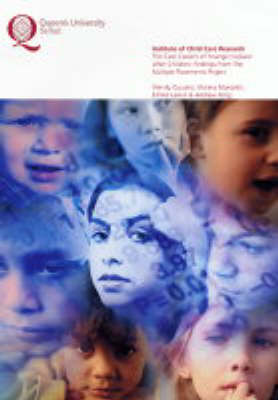This report presents findings from a longitudinal research project funded by the Research and Development Office for Health and Personal Social Services in Northern Ireland and carried out by the Queens University Belfast Institute of Child Care Research. The study examines the extent of stability in the care careers of 388 younger looked after children (under 5years old) and the factors which may influence this.
Chapter one provides an overview of the policy background to this piece of research both in the UK generally and Northern Ireland in particular.
Chapter two outlines the theoretical perspectives on which the study draws including primarily the concept of care careers, the life course analysis approach and social ecology theory. This section outlines the literature on these topics before moving on to discuss concepts of attachment, stability and care-planning.
Chapter three describes the research methodology and following chapters in the report present findings from data collected from the Social Services administrative system (SOSCARE) and the children’s case files in 2000 and again two years later in 2002.
Chapter four presents data on the care careers of the children in the study. This chapter begins by examining key dimensions of the children’s care careers such as the length of time in and the types of placements in which the children are living. It then examines movements out of the care system and finally attempts to operationalise placement instability and placement permanency. In particular, it focuses attention on the children’s placement histories over the two year ‘window’ between the census periods.
The majority of the children (72%) were in foster care at the start of the study and the majority (40%) were in foster care two years later. The high number of adoptions over the 2000 to 2002 time period (21%) is highlighted, as is the smaller number of children who had gone home to their birth parent(s) either with (7%) or without (15%) Care Orders in place. Almost two thirds (68%) of the 242 children who remained in care over the 2000-2002 period were considered to have high stability care careers, whereas slightly less than a third (32%) were classified as low stability. Just over a third (34%) of these children who were still looked after in 2002 were in a placement categorised as permanent.
Chapter five discusses findings on the child and family background. There was a fairly even split between males and females in the survey population with 192 children described as male and 196 as female. The majority of the children (64%) were aged less than two years when they first became looked after. There was also a fairly even spilt with regard to religion, with 49% of the children described as Protestant and 45% as Catholic. The high levels of adverse family circumstances such as lone motherhood, parental unemployment and instances of alcohol abuse, mental illness, domestic violence, offending behaviour, sexual abuse, drug abuse and bereavement are also discussed.
Chapter six discusses the social work processes concerning the children’s care careers. The majority of children were first referred to social services because of neglect (32%). With regard to legal status on first being looked after, the majority of the children (55%) were voluntarily accommodated. Analysis also revealed that it was more likely for legal status to be changed from accommodated to care order (17%) than from care order to accommodated (1%). Children who were accommodated in when first looked after were 14% more likely to have exited the care system in 2002 than those children subject to care orders. The level of completion of the Looked After Children (LAC) forms was also examined and it was found that the Review of arrangements form was the most consistently well filled out (90% up until 2000 and 78% from 2000 until 2002). Higher numbers of social workers were associated with of lower amounts of placement stability and permanency.
- ISBN10 1900725215
- ISBN13 9781900725217
- Publish Date September 2003
- Publish Status Active
- Publish Country GB
- Imprint Queen's University Belfast Institute of Child Care Research
- Format Paperback
- Pages 109
- Language English
